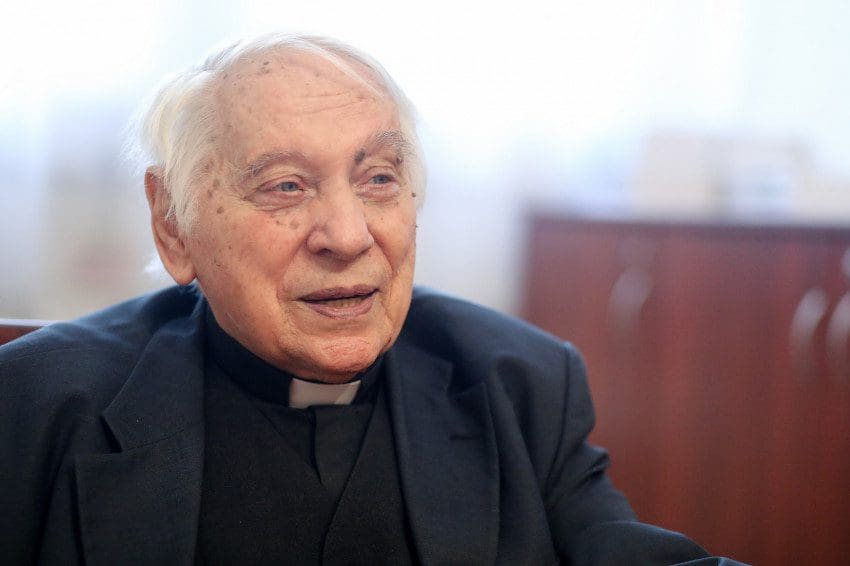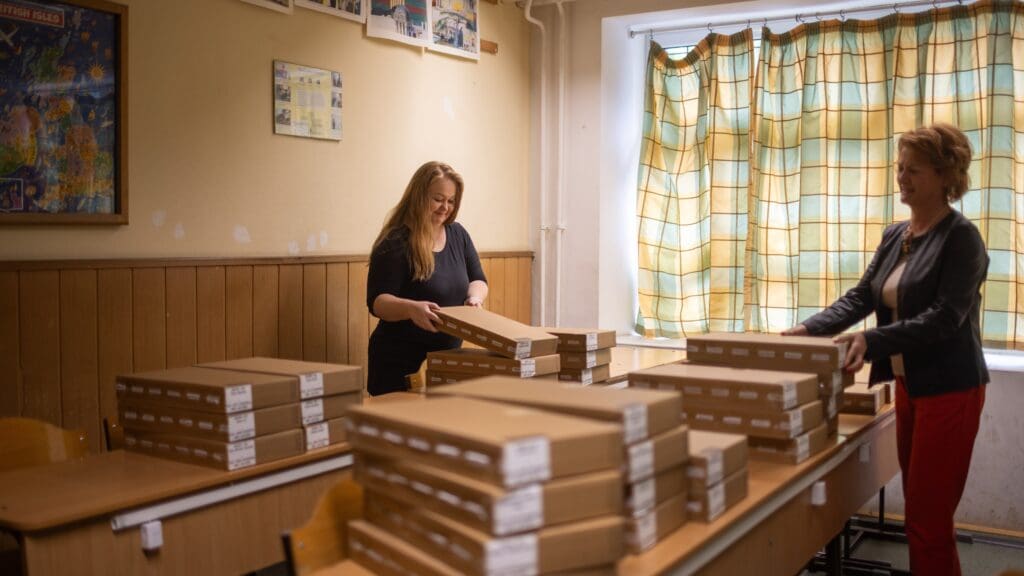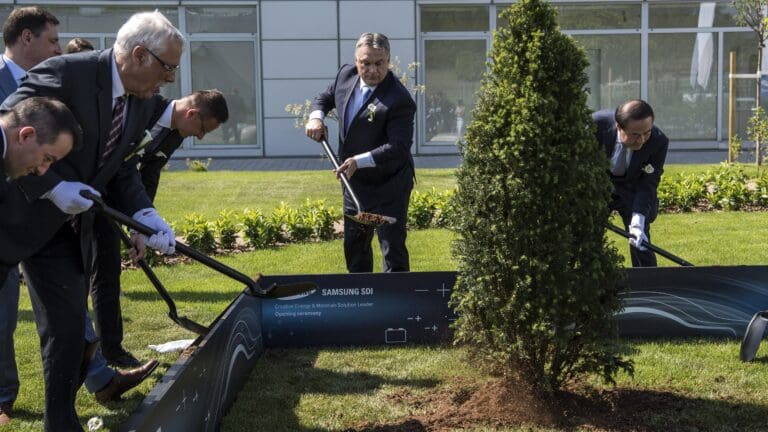Father Attila Farkas Interviewed by András Jancsó
Dr Attila Farkas was a retired pastor of St Stephen’s Basilica in Budapest, archiepiscopal counsellor, and art historian, born in 1929 in Budapest. He lost his mother at the age of three weeks, so he spent a significant part of his childhood with his grandparents and in the orphanage at Bicske. As a resident of the orphanage, he was able to take part in the 34th International Eucharistic Congress, the first to be held in Budapest, in 1938. Over the course of a long and full life, he served Budapest’s principal church for more than fifty years, and played a prominent role in its restoration. For thirteen years he served as the director of the Christian Museum in Esztergom. Then, as director of the National Catholic Collection Centre, he spent decades carefully preserving the material mementos of our Christian values.
This year’s International Eucharistic Congress will mark the first time since 1938 that the event has been held in Budapest. Father Attila, you had the opportunity to participate in the first Hungarian congress. How do you remember it?
We received a spiritual education that prepared us for the wonderful experience that was the 1938 Eucharistic Congress
In 1938, I was a child, living in the orphanage at Bicske. One very fine thing was that, though it was a state institution, our teachers were the Sisters of Mercy of the Holy Cross (SCSC) of Zsámbék, and they strove to teach us the love of God. We received a spiritual education that prepared us for the wonderful experience that was the 1938 Eucharistic Congress. So it was in the Bicske orphanage that I impatiently awaited the festive occasion, along with the other little orphans. We came to Budapest by special train, which was a great experience for all of us. We leaned out of the train window with flags in our hands, waving with great enthusiasm, and singing the anthem of the congress in our high-pitched voices: ‘Christ, you’ve given us salvation in the form of bread and wine, in Your peace, let every nation share this sacrament divine.’ The interesting thing is that I particularly recall that expression, ‘in peace’. I was already able to grasp its essential meaning. By 1938, we could already sense that the world was being prepared for war. Undoubtedly this was partly due to the internal tensions that existed in Hungary at that time, since even if they did not directly affect me, it was perceptible in Hungarian public life that something was the matter. And indeed it was: a year later, the Second World War broke out. I was still in the Bicske orphanage when war broke out, but later they sent everyone back to what family they had. I went to stay with my grandparents.
The 1938 Congress took place in the last year of peace before the Second World War, but as you mentioned, there were already signs of dark clouds spreading gradually across Europe. One such instance was Hitler’s ban on German Catholics attending the congress. Thank God, the Nazi dictatorship is now behind us. In the twenty-first century, however, the shadow of another dictatorship now falls upon us, one which Pope Emeritus Benedict has often described as ‘a dictatorship of relativism’. How do you see the role of Christians in the twenty-first century, facing the challenge of relativism?
I think that when the Pope chooses to state something clearly, he dares name the problem precisely because he may already have found a cure for it. At any rate, reconciliation with God and the sacred service of the divine laws should require of us a daily sacrifice. If we Christian people were willing to live according to God’s plan and God’s laws, I think we could more easily get through this rather uncomfortable period, which is leading us towards who knows what uncertainty. Back then, we in the Bicske orphanage received an upbringing that attuned us, even at that early age, to the love of God and the duty to live our daily lives according to the law of God and Our Mother, the church.
What meaning do you sense in the fact that Hungary is once again able to host the International Eucharistic Congress?
I dare only answer that the Good Lord loves us Hungarians especially. To certain generations—including my own—it has been granted that we should live to see both Budapest congresses. I was able to experience the first one together with the other orphans when we came to Budapest by train, singing the anthem of the congress. Being able to experience this again, as an adult, is a great gift of Providence to an elderly priest. I think few are given the opportunity to relive such uplifting experiences, not only in historical terms, but also as a rare gift in their own human lives.
Eighty-three years ago, Pope Pius XI was not present in person, but was represented by a papal legate, Cardinal Eugenio Pacelli, who became Pope Pius XII just a year later. It was wonderful to learn that this year Pope Francis will also be visiting Budapest for the congress. What is the significance of the Popeattending the event in person?
It is a great honour for us that the Holy Father will attend, as chief celebrant, the closing Mass of the International Eucharistic Congress in Budapest. It is not standard practice for the Pope to be present at a Congress in person— indeed it is quite rare—the Pope is usually represented by a papal legate.
One of the most important venues of both Budapest congresses is St Stephen’s Basilica, where Father Attila has been serving for more than fifty years. Here we preserve the most significant Hungarian relic, the right hand or Holy Right of St Stephen, the first beatified king of Hungary and founder of the state. What would St Stephen say to us in 2021?
It is beyond question that we Hungarians profoundly revere the Holy Right of St Stephen. We may ascribe it to God’s loving beneficence that although the rest of the body of St Stephen had turned to dust by the time the royal tombs of Székesfehérvár were excavated, the Holy Right of St Stephen was found intact. It was as if it were a sign, a divine message that God shall not forsake us, but through his saints shall lead us by the hand. Perhaps that is the central message of this hand. He does not seek to threaten, but to take us by the hand and lead us through the vicissitudes of history. It was an unforgettable experience for me when I first encountered the right hand of St Stephen, and now we are his guardians in St Stephen’s Basilica. This has also been a glorious sign in my own life. I have regarded the Basilica as a church of paramount importance since I was a child: at one time my father had an apartment nearby from which the Basilica could be seen. I always watched as priests and laypeople came and went through the side door of the Basilica. I never thought this would ever be the entrance I would take to the Father’s house, but it was granted to me by the grace of the good Lord. Every day I feel that St Stephen, by leaving his right hand with us, has left us with a message of great importance. There are few countries in Europe lucky enough to have had such a God-loving soul show his people the way from the very beginning. For us, the Hungarian saints—especially the earliest ones, including St Stephen—indicate with unprecedented significance that those who first set our country on the Christian path are still with us. No matter how worthy or unworthy we are, they are always by our side. We undoubtedly need the presence of these ancient Hungarian saints: their spirit and spirituality are with us today, and by following the example of theirconfessional life we ensure ourselves a future. This is what St Stephen sends us, also in the text of our Eucharistic Hymn:
Orphaned nation of Saint Stephen,
Bow your head and bend your knee;
Trust the King far greater even
Than that king of Hungary.
Faithful, though besieged and harried,
Trust to Him your hopes and fears,
Christ who on the Cross has carried
All your hopes a thousand years.
Christ, you’ve given us Salvation
In the form of bread and wine,
In Your peace, let every nation
Share this Sacrament Divine.
You were banned from public preaching for a time under the communist dictatorship. What message do you send to those who are being persecuted today because of their Christian faith and values?
The twentieth century is known as the century of martyrs. I pray, we all pray, for those Christians who are still persecuted today, and enjoin them to persevere in their faith
There are barriers to the spread of Christianity in all ages. At that time, we lived in an atheistic world under communism. It was hard for the system to bear the fact that, in addition to one hundred or so university-age congregants, my Masses were attended by a large number of believers, and my sermons were listened to attentively. That is why they forbade me to speak in public. After that, I was temporarily unable to speak at my Mass, and instead only my superior, who was the only one they judged ‘reliable’, was permitted to preach. Christians are still persecuted in a number of places around the world. The twentieth century is known as the century of martyrs. I pray, we all pray, for those Christians who are still persecuted today, and enjoin them to persevere in their faith, to be the confessors of our time, and to set a good example for those who are deprived of faith! Our nation, meanwhile, is doing all it can to support those suffering persecution or worse on account of their faith. Unfortunately, Europe hardly resembles itself, and does not adhere to its Christian roots in all things. Thank the Lord, however, that in our country our churches are more or less full on Sundays and holidays, which means that our people continue to listen to their pastors. We should be grateful for this, for there are few communities that listen to their leaders even after disappointments. We should attend especially to those for whom Christianity is nowadays, unfortunately, only ‘cultural heritage’.
Expanding on this idea, perhaps we could also say that cultural Christianity—as it appears in the arts, and in our churches—though genuinely valuable, is worth nothing if there is no practice behind it, that is, the confession of our faith.
I believe that things continue to speak, even when they exist only in and of themselves. Churches remain churches, altars remain altars, even if few visit them. They continue as beacons, calling to all who will hear. I steadfastly hope that those who enter churches, perhaps only out of curiosity, will leave with experiences which open further doors for them, enabling them to ‘find faith’. In this I place my hope and trust.
Translated by Thomas Sneddon







